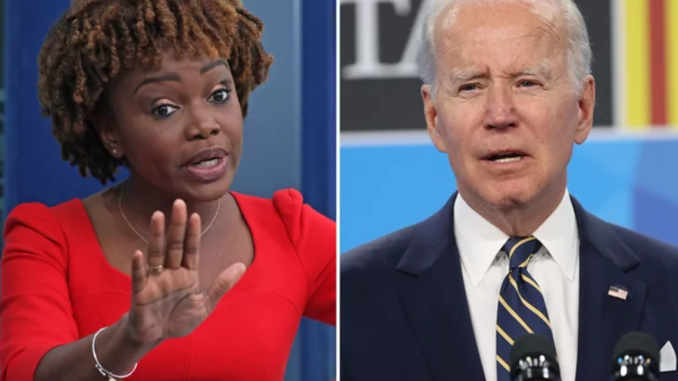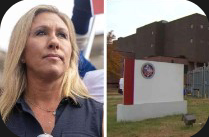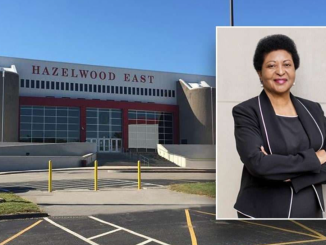
President Biden and White House press secretary Karine Jean-Pierre took no questions from reporters Friday after 71 journalists signed an unprecedented letter calling for an end to the mysterious prescreening of media members let into Biden events.
The president held a single public event and reporters were shooed out while he was mid-sentence, making questions impossible. Jean-Pierre did not hold a briefing and had left the West Wing by early afternoon for a personal obligation.
Thursday’s letter, addressed to Jean-Pierre, requested that the White House reopen to all reporters the East Room and other large indoor event spaces that during past administrations were “open press.”
For more than a year, the White House has required reporters to RSVP for events where Biden often takes questions. Those let in are picked based on a secret criteria that officials have refused to share even with leaders of the White House Correspondents’ Association.
The restrictive and non-transparent practice has endured more than a year after COVID-19 capacity limits ended in the White House briefing room in early June 2021 — leading many journalists to fear a new precedent detached from the easing pandemic.
The letter was the talk of White House press workspaces Friday and three additional journalists requested to add their names after 68 signed prior to the note’s dispatch to Jean-Pierre. Other journalists expressed regret for not checking their emails while covering Biden’s trip this week to Germany and Spain, where the president frustrated reporters by calling on just five journalists in a snappy 27-minute press conference Thursday.
Nearly two-thirds of White House briefing room seats were represented in the protest letter and journalists in some of the other seats privately expressed support for the cause.
Jean-Pierre didn’t respond to requests for comment. But in a telling sign that the message was received, the press office on Friday allowed two journalists into Biden’s event, including one from The Post, who hadn’t been let into an indoor event through the selection process since November.
Reporters, however, weren’t able to question Biden at the event in the White House-adjacent Eisenhower Executive Office Building, which houses a mocked-up TV set in an auditorium. As Biden continued a discussion with Democratic governors about abortion policy, the press was asked to leave.
The White House then scrapped Biden’s scheduled Friday afternoon South Lawn departure to the presidential retreat at Camp David, Md. — citing “bad weather” despite cloudless skies, possibly due to potential thunderstorms. Biden instead took a motorcade for the drive of about one hour to Camp David, which meant reporters had no opportunities for questions.
The fear among the press corps is that access restrictions for large indoor spaces will become permanent — disadvantaging various groups of reporters in the future based on evolving official whims.
“The current method of allowing a limited number of reporters into these events is not only restrictive and antithetical to the concept of a free press, but it has been done without any transparent process into how reporters are selected to cover these events,” the protest letter says.
“The continued inability of the White House to be candid and transparent about the selection process for reporters attending his remarks undermines President Biden’s credibility when he says he is a defender of the First Amendment,” it continues.
An influx of guests in the East Room last month were told to “just sort of lean against one another” by President Biden, ruling out COVID-19 restrictions as a reason for journalists’ limited access.
“The incongruity of these restrictions underscores the belief by many reporters that the administration seeks to limit access to the president by anyone outside of the pool, or anyone who might ask a question the administration doesn’t want asked.”
“Let us be candid,” the letter goes on. “Our job is not to be liked, nor is it to be concerned about whether or not you like what we ask. Reporters’ ability to question the most powerful man in our government shouldn’t be discretionary.”
“The administration’s continued efforts to limit access to the president cannot be defended,” it adds. “Any notion that space is ‘limited’ is not supported by the fact that every other president before Biden (including Trump) allowed full access to the very same spaces without making us fill out a request form prior to admittance.”
The letter concludes, “Thank you for your attention to these ahistorical problems. We ask you to see to it that the protocols are changed back to the access norms to which we are accustomed.”
CNN’s Kaitlan Collins, CBS’s Ed O’Keefe and Fox News’ Jacqui Heinrich and Kevin Corke signed the letter, as did legendary former ABC anchor and White House reporter Sam Donaldson, TheGrio’s April Ryan, Newsmax’s James Rosen, Gray Television’s Jon Decker and Al Jazeera’s Kimberly Halkett.
The letter was drafted by veteran journalist Brian Karem, who currently writes for Salon and has covered the White House since the Reagan administration. The second signature was from CBS News Radio’s Steven Portnoy, the president of the White House Correspondents’ Association, which privately lobbied against the practice for months. A reporter for The Post signed third and helped circulate the document.
Two other Correspondents’ Association board members — Todd GIllman of The Dallas Morning News and Francesca Chambers of USA Today — signed, as did past presidents of the association Tom DeFrank and George Condon, both of National Journal, and all five candidates in this year’s association election, including Eugene Daniels of Politico and Sara Cook of CBS.
High-profile journalists who reported on the Trump administration — including Jonathan Swan of Axios and Maggie Haberman of the New York Times — also signed, as did journalists with decades of experience in the West Wing, such as Peter Baker of the Times, Lynn Sweet of the Chicago Sun-Times and John Gizzi of Newsmax, as well as DeFrank and Condon.
The letter was a rare airing of grievances after many signers spent the past year attempting to privately lobby the press office to end the practice.
Many high-profile journalists signed the letter, from places like CNN, the New York Times and Fox News.
REUTERS
“Having covered the White House since June of 1968 as a Newsweek intern, I’ve seen a troubling erosion in access that was once routine,” DeFrank said.
The Correspondents’ Association still controls some access by custom, including assembling the rotating daily press pool and setting the seating chart for formal White House press conferences, of which Biden has had two. But for most journalists, the opaque selection process dictates access to almost all presidential events.
In a sign of how little COVID-19 bears on current White House event planning, Biden last month told guests that were packed tightly into the East Room for a Pride Month event that they would have to “just sort of lean against one another” because they were crammed too closely to sit down.
White House spokespeople have steadfastly refused to divulge the criteria for selection to attend presidential events, contributing to a widely held belief that there is no objective criteria and people are selected subjectively to shape questions posed to Biden.
Jean-Pierre said at a June briefing that “I actually don’t know” how the selection process works, but denied it amounted to “blacklisting” of certain outlets or reporters.
Former White House press secretary Jen Psaki in October also declined to share the criteria, saying at a briefing, “I don’t have any more information on that.”
* Article from: The New York Post


